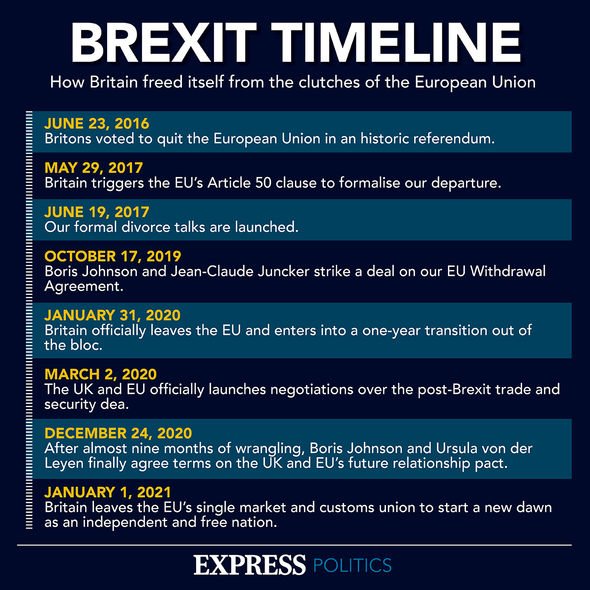Galileo: David Morris outlines UK’s role in project
The Global Navigation Satellite System (GNSS) is set to go online in five years and will feature a Public Regulated Service (PRS) to be used by government agencies, armed forces and emergency services. But the EU decided this “crucial feature” would not be accessible to the UK after Brexit, despite London playing an imperative part in its development. It is not the first time the UK and EU have squabbled over PRS – and, according to the Associate Director of the Atlantic Council, it almost stopped the UK signing up in the first place.
Writing for the US think tank, foreign policy expert David Wemer claimed: “Much of London’s hesitation over Galileo during its development in the Nineties and Noughties was, ironically, over the same PRS that may prevent the UK’s future participation in the system.
“PRS was first mentioned in a November 2000 European Commission report outlining the potential costs and services for the new Galileo system.
“To many EU states at the time, including the UK, the creation of a service that naturally could be used for military purposes managed by Brussels and using EU funds was a bridge too far.
“The idea that a system used by the British military for sensitive operations could be under the control of bureaucrats in Brussels was unacceptable to many in Westminster.”

The UK was kicked out of the Galileo programme by the EU (Image: GETTY)

Galileo will go live in 2026 (Image: GETTY)
And, as Mr Wemer pointed out, it was not just the UK who were concerned.
He detailed how former US Deputy Secretary of Defence Paul Wolfowitz sent a “scathing letter” over concerns the system would use “the same radio spectrum as the US GPS military service”.
He said the Americans feared “in times of conflict, they would have problems because of Galileo,” highlighting concerns that “the enemy could use some applications of Galileo and that they could not impede that”.
EU diplomatic sources claimed identical letters were received by several Brussels-based defence ministries in 2001.
It reportedly continued: ”I am writing to convey my concerns about security ramifications for future NATO operations if the EU proceeds with Galileo satellite navigation services that would overlay spectrum of GPS military M-code signals.”
READ MORE: UK lost £1.2bn Galileo stake despite supplying all key parts, and now has to pay to use it

Former US Deputy Secretary of Defence Paul Wolfowitz (Image: GETTY)
It added the US “plans a major modification to GPS to meet future military and civil requirements,” with a significant feature of the new system being a “spectral separation of the GPS military M-code signals from civil signals”.
It added: ”The addition of any Galileo services in the same spectre will significantly complicate our ability to ensure availability of critical GPS services in time of crisis or conflict and at the same time assure that adversary forces are denied similar capabilities.
“I believe it is in the interest of NATO to preclude future Galileo signal development in spectrum to be used by the GPS M-code.”
Former assistant secretary-general for defence support at NATO, Robert Bell, told a conference in Brussels that the organisation had concerns that Galileo could provide enemy forces with a positioning service that cannot be jammed without also blocking the existing US-operated GPS.
Hans Fromm, deputy head of the Navigation Department at the European Space Agency (ESA), dismissed the claims at the time.

Tony Blair signed the UK up to Galileo (Image: GETTY)
He said in 2002: “I would never suspect we would plan the signals in such a way.
“We have a frequency plan that takes into account American plans.”
According to Mr Wemer, the US’s attempt to intervene and warn of the flaws in the plan “backfired”.
He added in 2018: “The suggestion that if European governments relied on GPS for government purposes they could be unilaterally shut off by the Americans without warning stoked the interest of French and other EU member states in PRS.
“France and other EU member states worked hard to lobby Germany, Denmark, and others to abandon their initial opposition to the PRS.
“The UK still had serious concerns about who would control a PRS and its potential conflicts with GPS, but also knew that it would be unable to singlehandedly block the Galileo system over the issue, as voting would be conducted under the qualified majority vote (QMV) rules of the Council of the European Union, one of the EU’s main decision-making bodies.
“Normally, decisions on security and defence in the EU can only be made with the unanimous consent of the member states, but Galileo had been labelled as an economic and transportation issue by the European Commission as early as the Nineties.

Boris Johnson has ambitious plans for broadband (Image: GETTY)
“Despite the introduction of high-level security issues such as PRS, Galileo would remain subject to the EU’s economic rules. The UK had been outfoxed.”
Tony Blair’s Government joined up to Galileo in April 2002, despite the concerns raised.
According to Mr Wemer, the “UK still clung to hope that Galileo activities would remain wholly civilian” and that future decisions to use PRS for security use would “be subject to unanimous consent”.
Yet that same day a Commission statement celebrated that Galileo “will also give the European Union a military capability”.
The UK would go on to invest more than £1.2billion into the project in various forms for almost two decades
Not only did Surrey Satellite Technology Limited (SSTL) produce 34 “full operation” payloads for the system, but it also built the satellite that initiated Galileo.
Dubbed Giove-A, this spacecraft, launched in 2005, was the pathfinder that secured for the EU the use of its all-important radio frequencies to run the system.

Brexit timeline (Image: DX)
There would be no Galileo without them.
In an exclusive interview with Express.co.uk Chair of the Parliamentary Space Committee David Morris previously said all of the UK’s investments ”have been left with the programme”.
He added that the loss came “along with the UK radio spectrum technology that Tony Blair gifted the programme when the USA refused to share theirs”.
The Government, seeking a replacement for Galileo, has since acquired OneWeb – the low-Earth orbit (LEO) broadband constellation acquired from bankruptcy with Indian company Bharti Global.
The new Space-Based Positioning Navigation and Timing Programme (SBPP) will “consider newer, more innovative ideas of delivering global ‘Sat-Nav’ and secure satellite services to meet public, Government and industry needs”.
OneWeb has re-started launches of its satellites, with more than 100 now in orbit in preparation for a commercial service in 2021.
Last month’s launch saw 36 satellites blasted into space on a Soyuz rocket from Vostochny Cosmodrome in Russia.
Brexit: Expert discusses future of Galileo space project
OneWeb was designed as a broadband constellation first and foremost – it will provide rural 4G, and one day 5G, Internet signals in hard-to-reach places.
Prime Minister Boris Johnson had pledged to roll out universal full-fibre broadband by 2025 as part of the Conservative’s manifesto for the 2019 election.
OneWeb is reportedly now in talks with BT to use its satellite broadband technology to provide coverage to rural areas of the UK.
The Government hopes OneWeb will be able to provide modest speeds in rural Britain at a cheaper cost per household than the installation of extra cables in uneconomical places.
Under the government’s Universal Service Obligation (USO), everyone in the UK is guaranteed at least a 10Mbps broadband connection.
In theory, OneWeb’s network should be able to deliver ultrafast broadband speeds over 100Mbps and latency times of under 40ms, therefore fulfilling USO requirements.
OneWeb will operate in LEO, as opposed to the medium Earth orbits used by Galileo, GPS and other navigation systems.
It will also operate at a different frequency than those traditionally used for navigation.
But while the plan will see OneWeb’s first run of satellites used for broadband, future developments could reportedly include navigation capacity.







